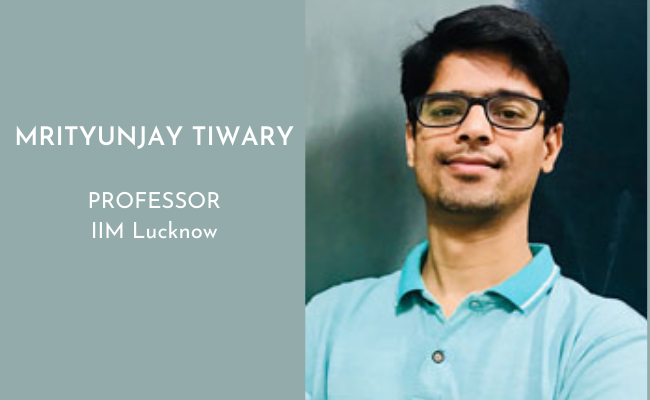IIM professor uses board games for teaching the class

Words like ‘class’ and ‘lecture’ arouse images of boring professors throwing up tedious lessons in front of a black (or white) board. However, Mrityunjay Tiwari, an IIM Professor, chose a different board to teach his students. He does not settle for a blackboard or whiteboard but uses a board in which people play games.
Students of IIM Lucknow are Professor Tiwari’s fans. They swear by his teaching methods and have marked his classes the most effective in the program. Mrityunjay Tiwary teaches Business Simulations to IIM Lucknow students in the last semester of the program. Thanks to Professor Tiwari’s offbeat teaching methods, the elective has merited the ‘Most unconventional course’ award.
Students connect with gaming
Video games were the dernier cri during the 1990s. Millennials took video games to another level. Getting the youth interested in board games is not a mean task. However, use board games in class, and students take to the games like fish to water.
Who is Mrityunjay Tiwari?
Mrityunjay Kumar Tiwari is a professor of Finance and Accounting at IIM Lucknow. He confessed that he was more interested in outdoor sports earlier. When Tiwari was pursuing his Ph.D. in IIM-B, his friends had coaxed him into joining them in their rounds of playing board games. The friends used to discuss and analyze each game once they played. Mrityunjay realized that while playing board games, players often applied the concepts they had picked up in their Management programs.
The post-game analysis triggered Tiwari to adapt board games as teaching tools. Once the idea took shape, Tiwari did not look back. He reverse-engineered the tactics to apply board game strategies to teach Management. Furthermore, it worked perfectly too!
A roller-coaster ride
Nevertheless, the ride was not all smooth sailing when Tiwari started working on it. Logistics of applying one-player or two-player games in a class of twenty-five to sixty required concerted efforts from the Professor. He had to tweak the rules and go through several simulations before finalizing the course structure for the elective. Many volunteers were happy to help him in developing the course. Tiwari strived for a year and a half to combine lessons with amusement by revamping the game rules to suit large-sized teams.
The institute cooperated with Tiwari to ensure he succeeded in carrying out the course as planned. Most lectures are of ninety-minute duration. The B-school permitted Tiwari to stretch the class for as long as the game and discussion lasted.
How does the game combine with management theory?
The Professor has not disclosed which of the board games he uses for teaching the elective. He has admitted to using Monopoly for the course but does not say anything more. He would instead retain the uniqueness of the course for now.
The game involves imbibing students with the practices of Management. Students must apply the lessons they have learned in their classes, so the institute offers the elective in the last semester of the program.
The Professor conjures up a simulated corporation by dividing the class into groups, assigning a CEO for each group who delegates responsibilities to other members. The members engage in business practices, take decisions, and study the consequences of their actions.
The flip side
The game requires people to be present physically on the board. Discussions among both teammates and other participants are mandatory to play the game. The present format rules out using it in the virtual classroom. Given the restrictions of the lockdown imposed to battle the novel coronavirus, it is not possible to apply the board-game structure for the course.
Fortunately, the course is due for teaching between January and March. The Professor is hopeful the pandemic situation would have changed for the better by the end of the year.
Stay connected with fellow students on PaGaLGuY for CAT Exam Discussion.
Stay connected with fellow students on PaGaLGuY for IIM Lucknow 2020-2022 [Official]
